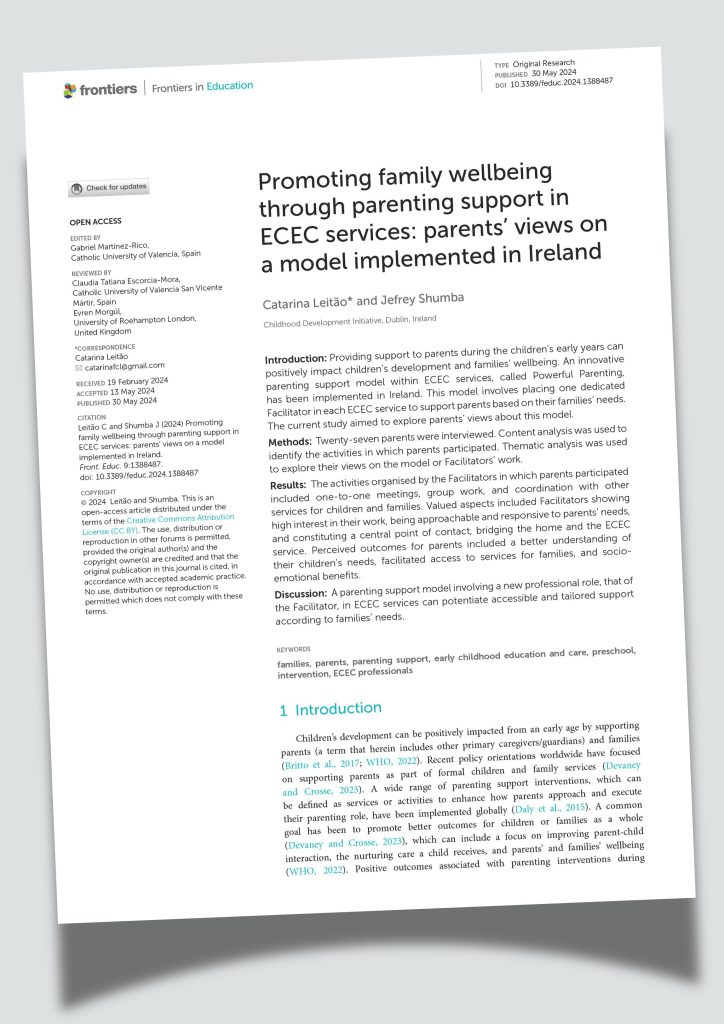Here at the Childhood Development Initiative, we are dedicated to conducting both internal and external evaluations of our interventions to ensure the utmost quality and effectiveness of our services. Our journey in prevention and early intervention programmes began in 2004 with a baseline study called “How Are Our Kids?” which examined the lived experiences of children in Tallaght West. Building upon this study, we have since developed a comprehensive suite of prevention and early intervention programmes tailored to address the specific needs of our community and achieve improvements in various outcomes.
We are passionate about evidence-informed practice and have an effective monitoring and evaluation process in place to ensure the ongoing improvement of our work. Our Quality Services, Better Outcomes Framework was developed in 2019 and provides a strong foundation for the planning, monitoring, and evaluation of interventions.
Below is an extensive list of our evaluations conducted across our many programme areas.
Evaluation reports: Active Programmes
CDI – Overall
Ante-Natal to Three Initiative
- Final Evaluation of ATTI 2016
- ATTI Interim Report 2016
- ATTI Baseline Research 2014
- ATTI Consultation Report 2023
Chit-Chat
- Listen up: Reflections on the CDI and HSE Speech and Language Services in Tallaght West 2016
- Speech and Language Therapy Evaluation 2012
Doodle Den
- Doodle Den Report for the Academic Year 2020/2021
- Doodle Den Longitudinal Study 2016
- Doodle Den Evaluation 2012
Doodle Families
- Parent/Home Literacy Environment Outcomes: An Independent Evaluation of Doodle Families 2019
- Literacy, Learning and Linkages: A Process Evaluation of the Doodle Families Programme 2018
- Evaluation of the Doodle Families Literacy Programme Pilot 2016
CDI Doodle STEAM Programme Evaluation Report
This document is the report evaluating the effect of CDI’s Doodle STEAM Programme. The evaluation examines programme effect over one eight-week iteration of the programme, delivered in seven primary schools in the final term of the 2022/23 school year. A mid-term evaluation report was completed and presented to CDI in September 2023, examining the effect of Doodle STEAM on participating parents/carers immediately after completing the eight-week programme. This report builds on that mid-term evaluation and inserts an additional focus on the extent to which the effects of Doodle STEAM continued for parents/carers six months after completing the programme.

Parental Support
Promoting family well-being through parenting support in ECEC services: parents’ views on a model implemented in Ireland

Summary
Promoting family well-being through parenting support in ECEC services: parents’ views on a model implemented in Ireland explores CDIs parenting support model, Powerful Parenting, implemented in Early Childhood Education and Care (ECEC) services in economically disadvantaged areas of Dublin, Ireland. The model employs Parent Carer Facilitators (PCFs) in ECEC centres to support families by working closely with parents to identify and address their needs through tailored support such as one-on-one interactions, group activities, home visits, and resource facilitation.
Key Findings:
- Activities and Support: PCFs provided emotional, informational, and practical support, including guidance on parenting practices and help accessing external services. Group activities included educational workshops and interactive sessions involving both parents and children.
- Parental Views: Parents appreciated the PCFs’ approachability, responsiveness, and role as a bridge between home and the ECEC centre. Outcomes included improved understanding of children’s needs, better access to support services, and enhanced socio-emotional well-being.
- Model’s Strengths: The programme’s individualised, relationship-based approach recognises the different influences on families and fosters positive interactions in their immediate environments (home and school).
- Challenges and Context: The study occurred during the COVID-19 pandemic, which influenced family dynamics and service delivery. The findings suggest that the model’s adaptability to diverse needs and environments is a significant advantage.
This innovative approach contrasts with many existing programmes by embedding a dedicated parenting specialist directly in ECEC centres, enhancing accessibility and continuity of support. The study highlights the potential of such models to improve family and child outcomes in disadvantaged areas.
- Evaluation of Powerful Parenting 2022
- Supporting Parents with Young Children in Ireland: A Comparative Review of European Evidence-Based Interventions
- Prisoners Returning Home: Prisoners and Family Reintegration 2019
- Early Years Evaluation 2013
- Engaging Fathers in Early Childhood: An overview of best practice, policy and insights from the Island of Ireland.
Restorative Practices
- Restorative Practices Training: Usage and Impact 2021
- TReP: Evaluation of the Pilot Course 2021
- Restorative Practice Evaluation 2013
Our Earlier Programmes
Community Safety Initiative
- Community Safety Initiative – Evaluation of Assignment of RAPID Coordinators 2015
- Community Safety Initiative Evaluation 2013

